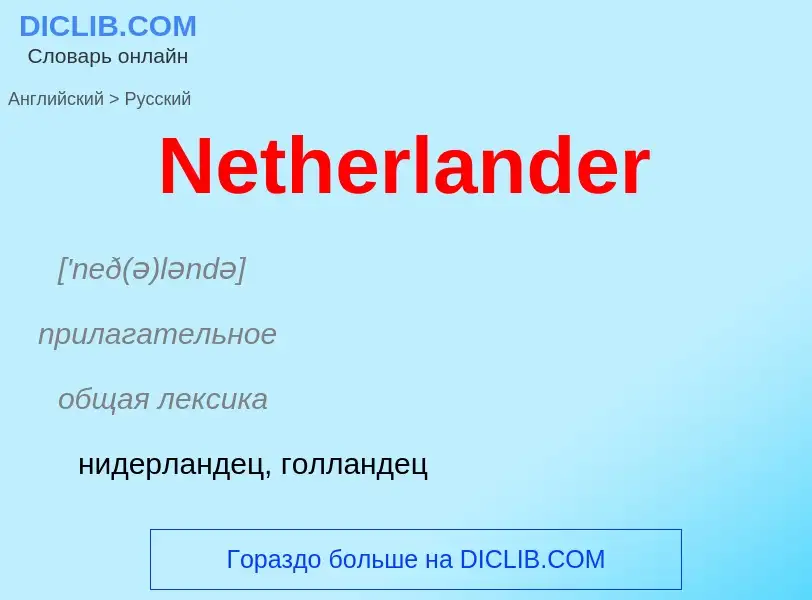Traducción y análisis de palabras por inteligencia artificial ChatGPT
En esta página puede obtener un análisis detallado de una palabra o frase, producido utilizando la mejor tecnología de inteligencia artificial hasta la fecha:
- cómo se usa la palabra
- frecuencia de uso
- se utiliza con más frecuencia en el habla oral o escrita
- opciones de traducción
- ejemplos de uso (varias frases con traducción)
- etimología
Netherlander - traducción al ruso
['neð(ə)ləndə]
прилагательное
общая лексика
нидерландец, голландец
существительное
общая лексика
уроженец или житель Нидерландов
нидерландский подданный
голландец
голландка
Definición
Wikipedia
The Dutch (Dutch: Nederlanders) are a Germanic people living in the Netherlands. They share a common ancestry and culture and speak the Dutch language. Dutch people and their descendants are found in migrant communities worldwide, notably in Aruba, Suriname, Guyana, Curaçao, Argentina, Brazil, Canada, Australia, South Africa, New Zealand and the United States. The Low Countries were situated around the border of France and the Holy Roman Empire, forming a part of their respective peripheries and the various territories of which they consisted had become virtually autonomous by the 13th century. Under the Habsburgs, the Netherlands were organised into a single administrative unit, and in the 16th and 17th centuries the Northern Netherlands gained independence from Spain as the Dutch Republic. The high degree of urbanization characteristic of Dutch society was attained at a relatively early date. During the Republic the first series of large-scale Dutch migrations outside of Europe took place.
The traditional arts and culture of the Dutch encompasses various forms of traditional music, dances, architectural styles and clothing, some of which are globally recognizable. Internationally, Dutch painters such as Rembrandt, Vermeer and Van Gogh are held in high regard. The dominant religion of the Dutch is Christianity, both Catholic and Protestant, but in modern times the majority are no longer religious. Significant percentages of the Dutch are adherents of humanism, agnosticism, atheism or individual spirituality.

![Dutch family in [[Java]] c. 1903 Dutch family in [[Java]] c. 1903](https://commons.wikimedia.org/wiki/Special:FilePath/COLLECTIE TROPENMUSEUM W.L. Harmsen met familie en gasten in de tuin van zijn huis te Tjikadongdong TMnr 60052275.jpg?width=200)
![2000 U.S. Census]] 2000 U.S. Census]]](https://commons.wikimedia.org/wiki/Special:FilePath/Census Bureau Dutch in the United States 2000.png?width=200)
![Voortrekkers]]}} in South Africa Voortrekkers]]}} in South Africa](https://commons.wikimedia.org/wiki/Special:FilePath/Charles Edwin Fripp00.jpg?width=200)
![IPA]] symbols added for pronunciation comparison IPA]] symbols added for pronunciation comparison](https://commons.wikimedia.org/wiki/Special:FilePath/Comparison of English, Dutch and German sentence.png?width=200)
![migrants]] arriving in [[Australia]] in 1954 migrants]] arriving in [[Australia]] in 1954](https://commons.wikimedia.org/wiki/Special:FilePath/Dutch Migrant 1954 MariaScholte=50000thToAustraliaPostWW2.jpg?width=200)

![Middelburg]], [[Netherlands]] Middelburg]], [[Netherlands]]](https://commons.wikimedia.org/wiki/Special:FilePath/Dutch street.jpg?width=200)
![Traditional [[Cape Dutch architecture]] ([[Swellendam]]) Traditional [[Cape Dutch architecture]] ([[Swellendam]])](https://commons.wikimedia.org/wiki/Special:FilePath/Dutcharchitecture2.png?width=200)

![liberation of the Netherlands]] at the end of World War II on 7 May 1945 liberation of the Netherlands]] at the end of World War II on 7 May 1945](https://commons.wikimedia.org/wiki/Special:FilePath/Een uitzinnige menigte verwelkomt de Canadese bevrijders in Utrecht - An ecstatic crowd in Utrecht welcomes the Canadian liberators (4502667274).jpg?width=200)
![Paraná]], Brazil. Mill and houses in Dutch architecture on the left Paraná]], Brazil. Mill and houses in Dutch architecture on the left](https://commons.wikimedia.org/wiki/Special:FilePath/Moinho Parque Historico Carambei.jpg?width=200)
![SNP]] variation in the Netherlands SNP]] variation in the Netherlands](https://commons.wikimedia.org/wiki/Special:FilePath/NL PCs abdellaoui.jpg?width=200)
![ANV]]; it states the dividing line between both areas lies where "the great rivers divide the Brabantic from the Hollandic dialects and where Protestantism traditionally begins".</ref> ANV]]; it states the dividing line between both areas lies where "the great rivers divide the Brabantic from the Hollandic dialects and where Protestantism traditionally begins".</ref>](https://commons.wikimedia.org/wiki/Special:FilePath/NorthernDutch.png?width=200)

![The [[Act of Abjuration]], signed on 26 July 1581, was the formal declaration of independence of the Dutch Low Countries. The [[Act of Abjuration]], signed on 26 July 1581, was the formal declaration of independence of the Dutch Low Countries.](https://commons.wikimedia.org/wiki/Special:FilePath/Plakkaat van Verlatinghe.jpg?width=200)

